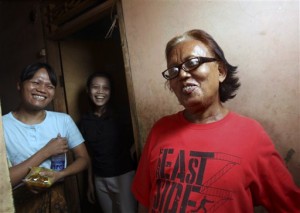Obama’s transgender nanny remembers ‘little Barry’

Barack Obama's former nanny Evie, right, shares a light moment with neighbors at her boarding house in Jakarta, Indonesia, Thursday, March 8, 2012. AP PHOTO/DITA ALANGKARA
JAKARTA, Indonesia—A transgender Indonesian man who shot to fame after it emerged he had worked as Barack Obama’s nanny in the late 1960s wants nothing from “little Barry” but to meet him again someday.
TV crews and reporters have descended on the tiny concrete shack in an east Jakarta slum, where Turdi, 66, now makes a meagre living from hand-washing his neighbors’ clothes.
“I am a big nobody, merely the help, so I expect nothing from Barry. But I certainly wish to see him again. Nothing more,” he told AFP at his home, which sits by a foul-smelling sewage canal.
Turdi said he has fond memories of eight-year-old Obama, his American mother Ann Dunham and Indonesian stepfather Lolo Soetoro, who treated him “like family” during the two years he worked in their home in the upmarket Jakarta suburb of Menteng.
“It’s impossible he will visit me here in my rented room. And to travel to America is something that can only happen in dreams. God willing and with patience, we will meet again,” Turdi said.
Article continues after this advertisementThe White House has not made any comment on the nanny’s reminiscences, but some of Obama’s old neighbors, who still live on the same street 40 years on, said they knew Turdi and accepted him as transgender.
Article continues after this advertisementBut during his time caring for the young boy who would become the United States’ first black president, Turdi tried not to let on that he was transgender, never wearing women’s clothes around him.
“I felt very free when I dressed like a woman, as if I had been released from prison. But I always appeared manly in front of Barry. He was too young to know about our world,” said Turdi.
Although Obama was popular, his friends would make fun of the nanny, calling him “banci,” a derogatory Indonesian term for transgender people.
“When I’d fetch him from school, his friends would mock me and shout ‘banci, banci’ But he ignored them and would just say ‘Come on, let’s go home,'” said Turdi, who asks his close friends to call him Evie.
The students would also tease Obama over his solid build, and his hair and complexion, he said.
“His friends would call him names like ‘Barry Negro’ when they lost a football match, but he would just laugh. He always said, ‘You must be prepared to win or lose a game.'”
Turdi said he was proud of Obama, the “ordinary black boy from a humble background who has become the American president.”
And he said he believed the leader could help to eradicate “all discrimination in the world,” including against transgender people like himself.
Turdi says he and his transgender friends have suffered repeated abuse, to the point where he decided it was safer to keep his appearance masculine.
Homosexuals and transgender people are largely shunned in Indonesia, a Muslim-majority country of 240 million people, and attacks against gay people by Islamic hardliners are common.
Fortunately, Turdi’s slum community accepts transgenders, with around 50 living in the vicinity.
Despite his journey from Obama’s old home to the slums, including a stint as a sex worker, Turdi seems at peace with how things have turned out.
He hopes to one day walk through Obama’s old elementary school with the president, having missed him when he visited Jakarta in 2010 and 2011.
“I want to tell him that not only Americans but everyone in the world salutes him,” he said.
“Once he pointed to a picture of (Indonesian) President Sukarno and said, ‘I hope I will grow up to become someone like him,’ I am proud that his wish came true.
“And if the Barry I knew is the same Barry who is America’s number-one man, I’m sure he will accept me for the person I am, transgender or not.”